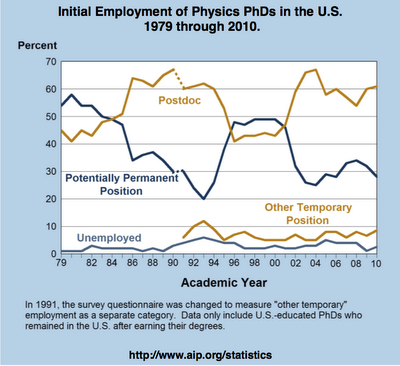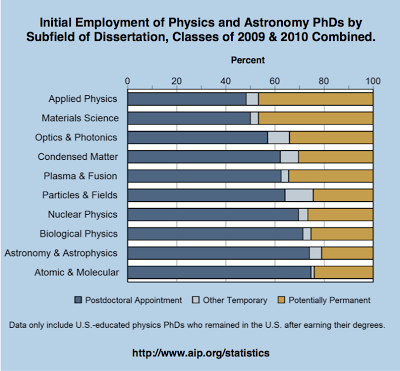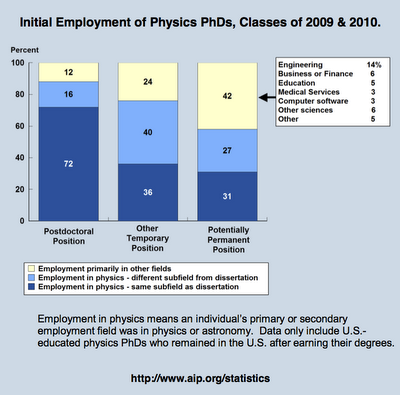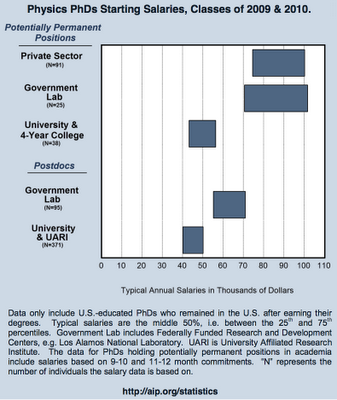Astronomy
As someone who just graduated from my PhD and went through an extensive job search, I was interested in the results from two recent studies by the Statistical Research Center at the American Institute of Physics. These studies looked at the initial employment of physics doctorates as well as a follow up with these same doctorates one year later.
The studies found that around 30% percent of newly minted PhDs (20% for astronomy/astrophysics) are accepting potentially permanent positions, down from an eight-year high of 34% in 2008, while more than 60% (70% for astronomy/astrophysics) are taking post-doc positions, up from a low in 2008 of about 55%.


According to the follow-up survey, 13% took post-doc positions because they ?could not obtain a suitable permanent position,? up from 7 percent for the graduating classes of 2007 and 2008. An additional 34% took post-docs, not because they desired the additional research experience, but because they felt it was a "necessary step into obtaining a future position." Of the graduates who obtained potentially permanent positions, only 25% were at colleges and universities. The rest were at government labs (16%) and in the private sector (59%).

Private sector potentially permanent positions had the highest median starting salary at $90,000, while potentially permanent government workers earned a median of $85,000. Perhaps surprisingly, the starting salary for a potentially permanent spot at a university is only marginally better than for a post-doc, about $50,000 per year compared with $45,000 per year. Post-docs at government institutions took in a median starting salary of about $63,400 per year.

I find it particularly interesting that astronomy/astrophysics is the subfield with the lowest number of doctorates going directly into potentially permanent positions. I found that when approaching my own job search, there was very little mentorship / guidance available about alternative career paths for astrophysicists outside of post-docs / academia. Perhaps this, along with the fact that there are less obvious industrial applications for astrophysics (compared to material science or condensed matter) explains why so few of us are getting permanent jobs after graduation.
For more information please visit the AIP Statistical Research Center.
- A Report From The (first Of Many?) Aas Dinner To Discuss Dual Career Couples
Today's guest post is by P. R. McCullough, M. Meixner (Space Telescope Science Institute), J. L. Christiansen (NASA Exoplanet Science Institute at Caltech), and L. A. Willson (Iowa State University). Earlier this year, Dr. McCullough wrote...
- Advice: Negotiating For A Tenure-track Position
When CSWA first started compiling advice on applying for tenure-track positions, we got some great suggestions on negotiating from Alison Coil. Alison is an associate professor at UC San Diego in the Physics department and Center for Astrophysics...
- 2 Careers, 2 Kids, 1 Marriage: Part 1
My wife, Ellen, and I are both scientists, married in graduate school, got jobs in the same city, had two kids and survived to tell about it. Here is the story of our schooling and jobs. Next time, I'll write about childrearing....
- Astronomy Vs. Data Science
In response to my last post about the transition from Astronomer to Data Scientist many readers wanted to know the pros and cons of academia versus tech. Below I outline a few of the major differences between these career paths. Obviously, there is...
- Something I Would Like To See The Decadal Report Address But Am Afraid It Won't
The Astronomy and Astrophysics Decadal Survey is assesing the "State of the Profession" in addition to science topics for the next decade. The study groups include Computation, Simulation, and Data Handling; Demographics; Facilities, Funding and Programs;...
Astronomy
Permanent Jobs Elusive for Recent PhDs
As someone who just graduated from my PhD and went through an extensive job search, I was interested in the results from two recent studies by the Statistical Research Center at the American Institute of Physics. These studies looked at the initial employment of physics doctorates as well as a follow up with these same doctorates one year later.
The studies found that around 30% percent of newly minted PhDs (20% for astronomy/astrophysics) are accepting potentially permanent positions, down from an eight-year high of 34% in 2008, while more than 60% (70% for astronomy/astrophysics) are taking post-doc positions, up from a low in 2008 of about 55%.


According to the follow-up survey, 13% took post-doc positions because they ?could not obtain a suitable permanent position,? up from 7 percent for the graduating classes of 2007 and 2008. An additional 34% took post-docs, not because they desired the additional research experience, but because they felt it was a "necessary step into obtaining a future position." Of the graduates who obtained potentially permanent positions, only 25% were at colleges and universities. The rest were at government labs (16%) and in the private sector (59%).

Private sector potentially permanent positions had the highest median starting salary at $90,000, while potentially permanent government workers earned a median of $85,000. Perhaps surprisingly, the starting salary for a potentially permanent spot at a university is only marginally better than for a post-doc, about $50,000 per year compared with $45,000 per year. Post-docs at government institutions took in a median starting salary of about $63,400 per year.

I find it particularly interesting that astronomy/astrophysics is the subfield with the lowest number of doctorates going directly into potentially permanent positions. I found that when approaching my own job search, there was very little mentorship / guidance available about alternative career paths for astrophysicists outside of post-docs / academia. Perhaps this, along with the fact that there are less obvious industrial applications for astrophysics (compared to material science or condensed matter) explains why so few of us are getting permanent jobs after graduation.
For more information please visit the AIP Statistical Research Center.
- A Report From The (first Of Many?) Aas Dinner To Discuss Dual Career Couples
Today's guest post is by P. R. McCullough, M. Meixner (Space Telescope Science Institute), J. L. Christiansen (NASA Exoplanet Science Institute at Caltech), and L. A. Willson (Iowa State University). Earlier this year, Dr. McCullough wrote...
- Advice: Negotiating For A Tenure-track Position
When CSWA first started compiling advice on applying for tenure-track positions, we got some great suggestions on negotiating from Alison Coil. Alison is an associate professor at UC San Diego in the Physics department and Center for Astrophysics...
- 2 Careers, 2 Kids, 1 Marriage: Part 1
My wife, Ellen, and I are both scientists, married in graduate school, got jobs in the same city, had two kids and survived to tell about it. Here is the story of our schooling and jobs. Next time, I'll write about childrearing....
- Astronomy Vs. Data Science
In response to my last post about the transition from Astronomer to Data Scientist many readers wanted to know the pros and cons of academia versus tech. Below I outline a few of the major differences between these career paths. Obviously, there is...
- Something I Would Like To See The Decadal Report Address But Am Afraid It Won't
The Astronomy and Astrophysics Decadal Survey is assesing the "State of the Profession" in addition to science topics for the next decade. The study groups include Computation, Simulation, and Data Handling; Demographics; Facilities, Funding and Programs;...
